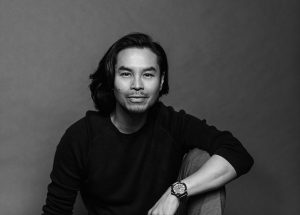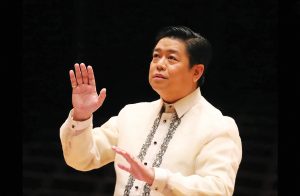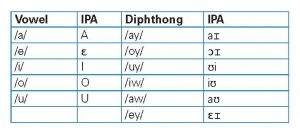Mr. Alcala, you have written several vocal music pieces using onomatopoeia. What was the reason you chose not to use a pre-existing text – or to write one? What role does onomatopoeia play in most of your works?
Nilo Alcala (NA): As a Philippine-born composer I have made it my mission to promote Philippine music and culture. A large number of my choral works are based on or inspired by chants from various regions of the Philippines. The main use of onomatopoeia in my choral works is to imitate the instrumental soundscape of the region where a specific chant is from. So for me, onomatopoeia does NOT replace an actual language but works side-by-side a specific dialect.
For chants from the southern Philippines, I use onomatopoeic phrases such as “tm taka taka tm tm” or “di-gi-ding ding di-gi ding” or “dang taka dang tang” to imitate either metallic or wooden percussion instruments from the region, as well as actual rhythms from their percussion-based music. (Listen to Kaisa-isa Niyan:
I also use onomatopoeia as a word-painting tool. For example, made-up words like “zzsshh” or “trrrr” may elicit images of chaos or disruption, as opposed to humming, which is inherently peaceful.
What challenges are introduced by the use of this particular language when composing vocal music?
NA: One common challenge is the pronunciation of these onomatopoeic words — but only if no pronunciation guide is available. For Filipinos, we would automatically read the onomatopoeic syllable-words “dum dum” or “tum tum” as “doom doom” or “toom toom” (and without aspirating the consonants). However, I’ve noticed that without a pronunciation guide, Western choirs will read the letter “u” as a schwa, and automatically aspirate the consonants. But this is easily corrected with a pronunciation guide or by using the IPA (International Phonetic Alphabet).
Mr Carpio, you recently recorded a CD called “Onomatopoeia” with the Philippine Madrigal Singers. What inspired you to record this programme?
Mark Anthony Carpio (MAC): Since the beginnings of the Philippine Madrigal Singers, our founder always made it a point to share and promote Philippine choral compositions in all our concerts. Since I became choirmaster in 2001, I have resolved to continue this mission. Moreover, I have committed myself to the preservation of these works through recordings, starting with composers who come from the ranks of the singers. “Onomatopoeia”, a collection of works by Nilo Alcala II, is one of the first albums we have come up with. Nilo, who sang with me from 2003 to 2006, contributed significantly to our repertoire with his original compositions. Many of his works require the voice to imitate the sound of Philippine native instruments, thus presenting an aural representation of what the text or story is all about. Things came to a head when I decided he had contributed enough works to put together an album.
What were the challenges you faced in using a language not made up of usual words?
MAC: First of all, Nilo’s works are based on existing languages. What he did was employ syllables that approximate the sounds of native instruments as an accompaniment to the melodies. Sometimes he would also make use of individual syllables from the words themselves. Even though these languages are spoken in our country, it doesn’t necessarily mean we understand them, nor do we know exactly how to pronounce the words. Many of these languages require different ways of shaping the mouth and coloring the voice. We would always ask for guidance, either from a native speaker, or from someone who has done some research about the language such as Nilo himself.
Which pronunciation rules did you apply to the onomatopoeia – those of the Philippine language or another one?
NA: I use Philippine pronunciation ‘rules’ for vowels, much like Italian vowels.
Philippine diction
Vowels are similar to Italian ones:
Consonants are always hard and non-aspirated. The letter “R” is always rolled.
What opportunities does the use of onomatopoeia – not a real language, not used in daily life — offer for vocal music?
NA: Onomatopoeia comes up once in a while in every-day conversation, when one is describing certain situations that involve sound. In my music, it is usually to imitate the musical instruments of a certain region where I got a specific chant from.
MAC: Composers of vocal/choral music spend much time choosing the text and words for their compositions. Sometimes, they are interested in the deep meaning of the words. At other times, they are interested in how colorful or attractive to the ear the words are. In the Philippines, we have quite a lot of children’s rhymes which do not make sense but are nevertheless still pleasurable to listen to. It is natural for us to invent words that are onomatopoeic in nature. It should not be surprising for these words to find their way into our songs.
Thank you!
 Trailblazing composer Nilo Alcala is carving out a legacy for Philippine Arts internationally. He is the first Philippine-born composer to receive the Copland House Residency Award, and to be commissioned by the Grammy-winner LA Master Chorale. He is also the first Filipino-American artist to be featured as Musical America Worldwide’s Artist of the Month, and winner of the Professional Division of The American Prize. He was a member and resident composer of the Philippine Madrigal Singers and has received two Ani ng Dangalawards from two Philippine Presidents. His works have been performed in Asia, Europe, Africa, and the Americas and his commissions include the San Bernardino Symphony Orchestra, C4, The Esoterics, Asia-Europe Foundation, Andrea O. Veneracion International Choral Festival; Korean Ministry of Culture; NAMCYA, Manila Symphony Orchestra, among others. Notable performances include World Youth Choir, Asia Pacific Youth Choir, C3LA, San Francisco Girls Chorus, and the South Dakota Symphony Orchestra. Asian Cultural Council grantee, Alcala was a Billy Joel Fellow at Syracuse University where he received the Irene L. Crooker Music Award. https://www.niloalcala.com/
Trailblazing composer Nilo Alcala is carving out a legacy for Philippine Arts internationally. He is the first Philippine-born composer to receive the Copland House Residency Award, and to be commissioned by the Grammy-winner LA Master Chorale. He is also the first Filipino-American artist to be featured as Musical America Worldwide’s Artist of the Month, and winner of the Professional Division of The American Prize. He was a member and resident composer of the Philippine Madrigal Singers and has received two Ani ng Dangalawards from two Philippine Presidents. His works have been performed in Asia, Europe, Africa, and the Americas and his commissions include the San Bernardino Symphony Orchestra, C4, The Esoterics, Asia-Europe Foundation, Andrea O. Veneracion International Choral Festival; Korean Ministry of Culture; NAMCYA, Manila Symphony Orchestra, among others. Notable performances include World Youth Choir, Asia Pacific Youth Choir, C3LA, San Francisco Girls Chorus, and the South Dakota Symphony Orchestra. Asian Cultural Council grantee, Alcala was a Billy Joel Fellow at Syracuse University where he received the Irene L. Crooker Music Award. https://www.niloalcala.com/
Mark Anthony Carpio is the choirmaster of the Philippine Madrigal Singers. He also heads the Andrea O. Veneracion Sing Philippines Foundation and spearheads several choral music development initiatives in the country. Mark earned his master’s degree in Choral Conducting and a bachelor’s degree in Piano from the University of the Philippines.
Edited by Anita Shaperd, USA




